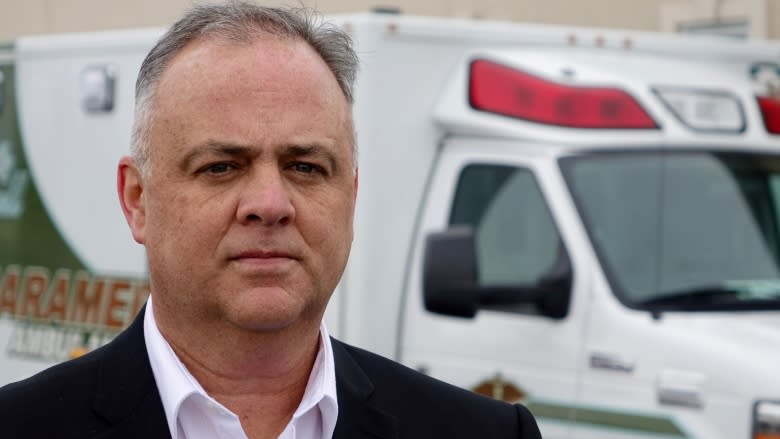'His lips were turning blue': mother wants investigation into long wait for ambulance
An Embrun mother wants the province to investigate after she waited 30 minutes for an ambulance to arrive while her baby boy's lips turned blue as he suffered a seizure earlier this month.
A dispatcher had earlier redirected the rural community's only ambulance to respond to a higher-priority call in Ottawa because of an ambulance shortage in Ottawa, confirmed the municipality's director of emergency services, Michel Chrétien.
Claudia Gorenko said she's lucky her four-month-old boy Benjamin is OK, but feels his life was put at risk. She has filed a complaint with Ontario's Ministry of Health and Long-Term Care.
"A 30-minute wait is not acceptable," said Gorenko. "I had to give him mouth to mouth [resuscitation]. His lips were turning blue. I told dispatch that."
'I was like, 'Oh my God'
Gorenko said her son has seizures and that he takes medication to control the problem.
But on Feb. 6, Benjamin suffered multiple seizures. A neurology team at the Children's Hospital of Eastern Ontario told Gorenko to call 911.
She was told it could take up to an hour for help to arrive.
"I was like, 'Oh my God, in 30 to 60 minutes anything can happen," said Gorenko. "What if he really starts cluster seizing?"
Chrétien confirms dispatchers later upgraded Gorenko's call from code three to code four, the highest level. But the township's closest ambulance was still 30 minutes away and had to race all the way from Bourget, Ont.
"Who made the decision that the Ottawa residents take precedence over us?" said Gorenko.
The health and safety of residents in both communities are equally important, she said, but the municipality of Prescott-Russell is getting short-changed, so she's encouraging residents to speak out.
"Why do they get our ambulances versus us getting our ambulances? We pay taxes as well. We pay taxes for those services," she said.
She also has concerns that her son's case wasn't initially dispatched as a life-threatening emergency.
'Nobody's impressed'
The mayor for the Township of Russell and the region's paramedic chief said what happened to Gorenko is not acceptable, and they're asking their MPP for help.
"Nobody's impressed," said Mayor Pierre Leroux. "I'm afraid that it's going to take someone dying for [the province] to realize how grave the situation is."
Ontario regulations require whichever paramedic is closest and available to respond to emergency calls.
Counties outside of Ottawa have become increasingly frustrated by the growing numbers of calls they answer in the city. And due to changes in provincial policy, adjacent municipalities are no longer reimbursed for attending to Ottawa's emergencies.
Prescott-Russell's paramedic service said it spent more than $500,000 of its own funds in 2016 responding to emergency calls in Ottawa.
The township filed a complaint last year with the province about a specific night when Ottawa called for help 13 times, which led to a damning report suggesting the Ottawa Paramedic Service has a systemic problem.
Chrétien said the problem has gotten worse lately.
His crews have responded to 80 calls in Ottawa in the past two weeks, he said. In one day alone his ambulances were deployed to 18 Ottawa emergencies, which he said was a new record.
In Gorenko's case, the Embrun ambulance that was re-routed to Ottawa did not end up transporting anyone to hospital, Chrétien said. It's an example of another problem with dispatching, he said, in which 75 per cent of the highest priority code four calls they respond to turn out not to be life-threatening emergencies.
Chrétien said he met with Gorenko about her complaint and directed her to raise her concerns with the province.
"Service wasn't rendered, I think, to this lady, and she has the right to raise the issue," said Chrétien.
'Level Zero'
Ottawa paramedic Chief Peter Kelly said in an email that he can't comment on any specific case, but that the city "has taken steps to address the increase in call volumes."
The city hired a dozen new paramedics in July and four new emergency response vehicles are now responding to calls in the community.
The service is also preparing to hire 24 new college graduates when they pass their provincial exam in the spring of 2017.
Ottawa's paramedic service has been regularly reaching a state called "level zero," during which no ambulances are available anywhere in the city at a given time.
Paramedics are sent in sedans until an ambulance is available, or other emergency services such as firefighters and police are deployed in cases of cardiac arrest.
There were 11 "level zero" warnings issued the week of Gorenko's incident, between Feb. 6 and 12. Another 21 "level zeros" happened between between Feb. 13 and 20, Kelly said.




